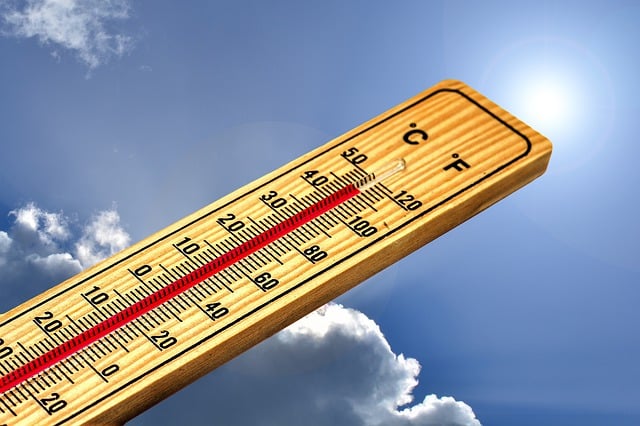Share This Article:

Climate & Comp
Washington, DC (WorkersCompensation.com) – In the summer of 2024, as temperatures reached record levels, President Joe Biden directed OSHA to institute protections for workers during extreme heat. This year, forecasters are predicting a summer of extremes, but OSHA still has no outdoor worker standards.
Now. as the country moves toward the unofficial start of summer on Memorial Day, forecasters are predicting record temperatures in 45 states this year.
“Meteorological summer starts on Sunday, June 1, and runs through the end of August, a three-month span that will feature sweltering heat, severe weather, intense wildfires and the start of a dynamic hurricane season,” forecasters at Accuweather said. “Many parts of the U.S. have already had a taste of summer warmth, including Phoenix, which had its earliest 100-degree temperature reading in seven years when the mercury cracked the century mark on April 10. And this is just a preview of what's to come as it is expected to be a hot summer for most of the country.”
The weather analysis organization said temperatures from June to August will be above average and the worst of the heat will be focused on the northern Rockies and across the Plains.
OSHA outlines guidelines on how to protect workers in the heat on its webpage. While five states - Washington, Minnesota, California, Oregon, and Colorado – have specific laws governing occupational heat exposure, federal OSHA standards only require employers to provide a place of employment that is “free from recognized hazards that are causing or are likely to cause death or serious physical harm to employees.” OSHA does provide recommendations on how to keep employees safe in extreme heat, however.
Whether other states will move to protect workers is unclear.
In Illinois, Gov. J.B. Pritzker vetoed a bill that would have protected warehouse workers. Pritzker said the legislation was too vague on who would be covered by it and said the process for enforcing the policy is unclear.
“In this tight budget year and in the face of unpredictable enforcement and funding from the federal government, it is critical that advocates, legislators and my administration work together to ensure any new labor laws are straightforward to implement and do not create a risk of legal challenges,” Pritzker said.
Pritzker said the Illinois Department of Labor has been charged with streamlining and prioritizing resources to build an enforcement team that can quickly respond to dangerous conditions, lack of meal and rest breaks, and other conditions.
In New Jersey, representatives from the Teamsters Union are pushing legislators for protections for all New Jersey workers during extreme weather. The union is calling on lawmakers to pass Assembly Bill 5022 that would require employers to protect workers from extreme weather conditions. If passed, the bill will require access to hydration, air conditioning, heat or shade, and other safeguards.
“We’ve already fought for and secured these protections in our national contracts,” Al Rispoli, president of Teamsters Joint Council 73, said. “Now, we’re taking that fight to Trenton to ensure every worker in New Jersey has similar protections. Rising temperatures put anyone working outside at risk, and strong safety measures are essential.”
Similar pushes are ongoing in Arizona, Connecticut, Illinois, Kentucky, Florida, Massachusetts, New York, and Rhode Island.
In some cases, employers are taking steps to protect their workers. This winter, Chick-fil-A workers donned protective bubbles to keep them safe in inclement weather. A Roseville, Michigan store provided its workers with a lime-green wearable box-like protective shield to keep workers safe.
Known as pickle pods, the personal protective equipment keeps workers out of the elements while they use iPads for taking customer orders. Workers wear the gear made out of heavy-duty plastic during rainy or snowy weather and have high-powered heaters blowing in the drive-thru lanes to keep them warmed up.
Worker advocates have fought for years to pass a national heat standard that would require employers to take simple measures, like providing water and or shade so workers could cool down.
But what will happen during the Trump administration is unclear.
President Donald Trump paused work on a federal standard for working in extreme heat on his first day in office as part of his executive order to freeze all rulemaking by executive departments and agencies. Additionally, the administration plans to close 11 area OSHA offices that protect workers from hazardous conditions like extreme heat. And the administration has begun to terminate workers at the National Institute for Occupational Safety and Health, the only federal agency mandated to produce research and recommendations to prevent work-related injury, illness and death.
AI california case file caselaw case management case management focus claims compensability compliance compliance corner courts covid do you know the rule employers exclusive remedy florida glossary check Healthcare hr homeroom insurance insurers iowa leadership medical NCCI new jersey new york ohio pennsylvania roadmap Safety safety at work state info tech technology violence WDYT west virginia what do you think women's history women's history month workers' comp 101 workers' recovery Workplace Safety Workplace Violence
Read Also
About The Author
About The Author
-
Liz Carey
Liz Carey has worked as a writer, reporter and editor for nearly 25 years. First, as an investigative reporter for Gannett and later as the Vice President of a local Chamber of Commerce, Carey has covered everything from local government to the statehouse to the aerospace industry. Her work as a reporter, as well as her work in the community, have led her to become an advocate for the working poor, as well as the small business owner.
Read More
- Feb 28, 2026
- Chris Parker
- Feb 27, 2026
- Liz Carey
- Feb 27, 2026
- Frank Ferreri
- Feb 26, 2026
- Frank Ferreri
- Feb 25, 2026
- Liz Carey
- Feb 25, 2026
- Anne Llewellyn




